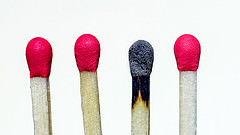An article on helpguide.org written by Melinda Smith, M.A., Jeanne Segal, Ph.D., and Robert Segal, M.A., explain great coping strategies as the "three R" approach: "recognize-watch for warning signs of burnout, reverse-undo the damage by managing stress and seeking support, and resilience-build your resilience to stress by taking care of your physical and emotional health."
The best thing to do, if you are noticing signs of burnout, is to use preventative strategies. Prevention is easier than recovery. You know what to do to prevent this, it's what we should be doing everyday only we don't.
1) Take time to relax, I know you don't have time to relax. Well you better make time and do it quickly or you won't be around for your life. Examples of relaxation include meditation, journaling, taking a walk, deep breathing, and stretching.
2) Eat healthy, obvious, but are you?
3) Exercise, even a simple walk or stretching is better than nothing.
4) Set boundaries in your life. Say no when you can't do something.
5) Do something you enjoy. Whether it's creative or physical, it is important.
6) Take a break from technology. Turn off that phone, computer or Ipad, and walk away from it for a while, it will be okay.
Yes, yes, yes, you've heard it all before, but it really is the answer. You really do have to take time for yourself and be healthy, it's not rocket science.
So, if you haven't done these things and you are in full-blown burnout you must learn how to recover.
I relied on www.helpguide.org again for this information:
While the tips for preventing burnout are still helpful at this stage, recovery requires additional steps.
Burnout recovery strategy #1: Slow down
When you’ve reached the end stage of burnout, adjusting your attitude or looking after your health isn’t going to solve the problem. You need to force yourself to slow down or take a break. Cut back
whatever commitments and activities you can. Give yourself time to rest, reflect, and heal.
Burnout recovery strategy #2: Get support
When you’re burned out, the natural tendency is to protect what little energy you have left by isolating yourself. But your friends and family are more important than ever during difficult times. Turn to your loved ones for support. Simply sharing your feelings with another person can relieve some of the burden.
Burnout recovery strategy #3: Reevaluate your goals and priorities
Burnout is an undeniable sign that something important in your life is not working. Take time to think about your hopes, goals, and dreams. Are you neglecting something that is truly important to you? Burnout can be an opportunity to rediscover what really makes you happy and to change course accordingly.
Recovering from burnout: Acknowledge your losses
Burnout brings with it many losses, which can often go unrecognized. Unrecognized losses trap a lot of your energy. It takes a tremendous amount of emotional control to keep yourself from feeling the pain of these losses. When you recognize these losses and allow yourself to grieve them, you release that trapped energy and open yourself to healing.
- Loss of the idealism or dream with which you entered your career
- Loss of the role or identity that originally came with your job
- Loss of physical and emotional energy
- Loss of friends, fun, and sense of community
- Loss of esteem, self-worth, and sense of control and mastery
- Loss of joy, meaning and purpose that make work – and life –
worthwhile
Source: Keeping the Fire by Ruth Luban
Remember to be patient. You did not burnout overnight, it was probably over several years, and it will take some time to recover, but you can recover. Do sometime good for yourself before you can't do anything at all.

 RSS Feed
RSS Feed